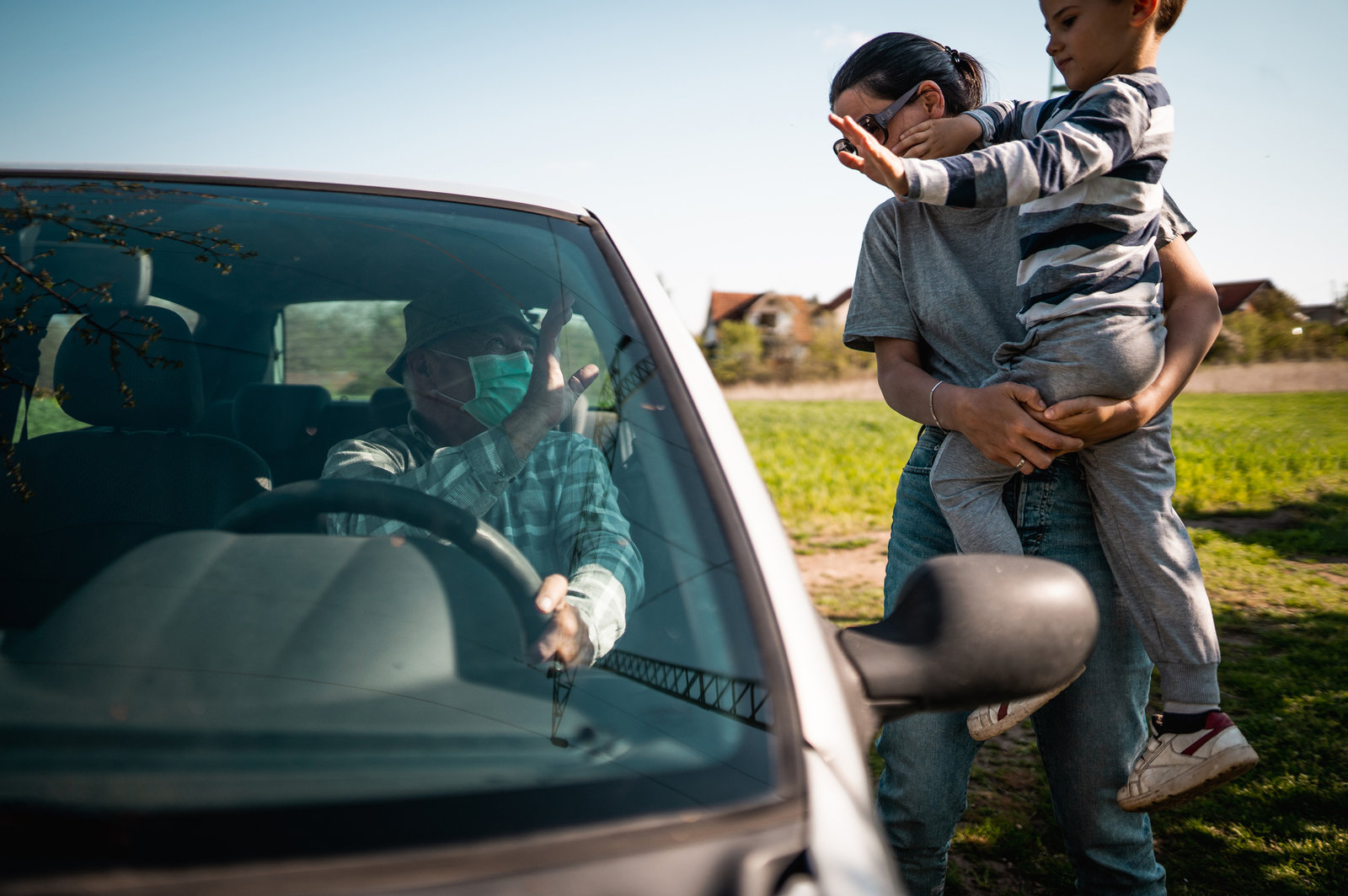去看望祖父母或年长的亲戚?降低风险的小贴士
去看望祖父母或年长的亲戚?降低风险的小贴士
One of the hardest things during this pandemic — for kids and adult children — has been staying away from their parents and grandparents.
对儿童和成年儿童来说,在这场大流行期间最困难的事情之一就是远离他们的父母和祖父母。
People 65 years and older are at higher risk for getting a severe case of COVID-19, according to the Centers for Disease Control and Prevention. And about 80% of deaths in the U.S. from COVID-19 have been in people older than 65.
据美国疾病控制与预防中心称,65岁及以上的人患COVID-19严重病例的风险更高。在美国死于COVID-19的人中,约80%的人年龄在65岁以上。

So it's been especially important for older people to practice social distancing — even from family members — to reduce the risk of infection.
因此,对老年人来说,保持社会距离,甚至与家庭成员保持距离,对降低感染风险尤为重要。
But the summer is here, communities are reopening and with many families living miles apart, a trip to see parents and grandparents is tempting. Here are some things to consider before you go.
但是夏天到了,社区重新开放,许多家庭相隔数英里,去看望父母和祖父母是很有诱惑力的。在你去之前,这里有一些事情需要考虑。
Assess the risk
评估风险
Remember, the risk of becoming severely ill with COIVID-19 increases with age, says Dr. Ravina Kullar, an epidemiologist and spokesperson for the Infectious Disease Society of America. So the older the parent or grandparent, the higher the risk is. And if your relative has an underlying health condition, like diabetes, lung disease, hypertension, or if they are immunosuppressed, "that puts them at even higher risk," Kullar says. So before the visit, assess the age and health of the person you are visiting — and consider whether the trip is worth the risk.
美国传染病学会发言人、流行病学家拉维娜•库拉尔博士说,要记住,随着年龄的增长,感染COIVID-19的严重风险会增加。因此,父母或祖父母年龄越大,风险就越高。如果你的亲戚有潜在的健康问题,比如糖尿病、肺病、高血压,或者他们有抑制(生物体的)免疫反应,“这会使他们面临更高的风险,” 库拉尔说。所以,在拜访之前,评估一下你要拜访的人的年龄和健康状况,并考虑一下这趟拜访是否值得冒险。
Plan ahead, by two weeks
提前两周计划
If you decide to make the trip, the two weeks leading up to the visit are key, says Dr. William Miller, an epidemiologist at Ohio State University College of Public Health. You want to reduce your chance of infection as much as possible. While complete quarantine may not be practical, limit outings or social gatherings, and take maximum precautions when going out.
俄亥俄州立大学公共卫生学院的流行病学家威廉·米勒博士说,如果你决定去拜访,去之前的两周很关键。你要尽可能减少感染的机会。虽然完全隔离可能不可行,但要限制外出或社交聚会,并在外出时采取最大限度的预防措施。
Practice social distancing, wear a mask, and work from home if possible, to reduce your chances of getting infected. Complete quarantine would mean staying entirely home except for necessary medical care.
保持社交距离,戴上口罩,尽可能在家工作,以减少感染的几率。完全隔离意味着除了必要的医疗护理外,完全呆在家里。
If you can, make it a road trip
如果可以的话,自驾游吧

Traveling by car will be safer than traveling by plane or train, Miller says. The main risks in a road trip are the stops along the way, such as restaurants or public restrooms.
米勒说,开车比坐飞机或火车更安全。公路旅行中最危险的地方是沿途的车站,比如餐馆或公共卫生间。
Kullar says. "If you have to fill up the gas tank, put gloves on and use hand sanitizer. Pack your own food so there are no additional stops at restaurants."
库拉尔说。“如果你必须加油,戴上手套,使用洗手液。自己打包食物,这样就不用在餐馆逗留了。”
Think twice before you fly
坐飞机前要三思
"Planes are a major concern," Miller says, despite the high level of air filtration on most planes. In planes you are exposed to people several rows ahead and behind, for an extended period of time. It can also be hard to social distance as you navigate the airports.
“飞机是一个主要问题,”米勒说,尽管大多数飞机的空气过滤水平很高。在飞机上,你会在一段很长的时间内,与前面和后面几排的人接触。当你在机场穿梭时,也很难与人保持距离。
If you do take a plane, bus or train, "choose routes that are less populous," says Dr. Emily Landon, a hospital epidemiologist and infectious diseases specialist at University of Chicago Medicine. "Make sure you are wearing a mask and using hand hygiene," she says.
如果你乘坐飞机、公共汽车或火车,“选择人口较少的路线,”芝加哥大学医学院的医院流行病学家和传染病专家艾米丽·兰登博士说。“一定要戴上口罩,保持手的卫生,”她说。
Should you get tested?
你应该做检测吗?
Kullar suggests getting a PCR test before you travel. That's the diagnostic test to determine if you are infected with the virus that causes COVID-19. People who are asymptomatic or presymptomatic can spread the virus, without even knowing they are infected. If your test is positive you should cancel your trip and quarantine yourself for 14 days and get retested. Also, it is important to tell anyone that you have been around of your positive test result, Kullar says.
库拉尔建议在旅行前做一个PCR检测。这是一种诊断测试,用来确定你是否感染了导致COVID-19的病毒。无症状或症状前的人可以在不知道自己感染的情况下传播病毒。如果你的测试结果是阳性的,你应该取消旅行,隔离14天,然后重新测试。库拉尔说,另外,告诉任何人你的阳性测试结果,这一点很重要。
Limit activities when you get there
当你到达(拜访的人)那里时,限制你的活动
What you do during the visit also matters. Avoid crowds, and stick to outdoor activities as much as possible.
你在拜访期间做什么也很重要。避开人群,尽量坚持户外活动。
"Don't go out to theme parks and museums [or other crowded places], even if the grandparents don't go along," Miller says. That's because most transmissions of the virus are thought to happen in household settings. So if you get exposed outside the home you could bring that home and infect your relatives.
“不要去主题公园和博物馆(或其他拥挤的地方),即使祖父母不跟去,”米勒说。这是因为大多数病毒的传播都发生在家庭环境中。所以,如果你在室外接触到病毒,你可能会把病毒带回家,感染你的亲戚。
- 频道推荐
- |
- 全站推荐
- 推荐下载
- 网站推荐


















